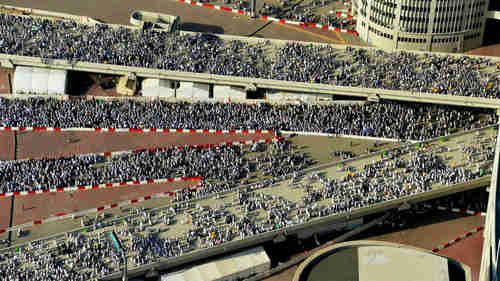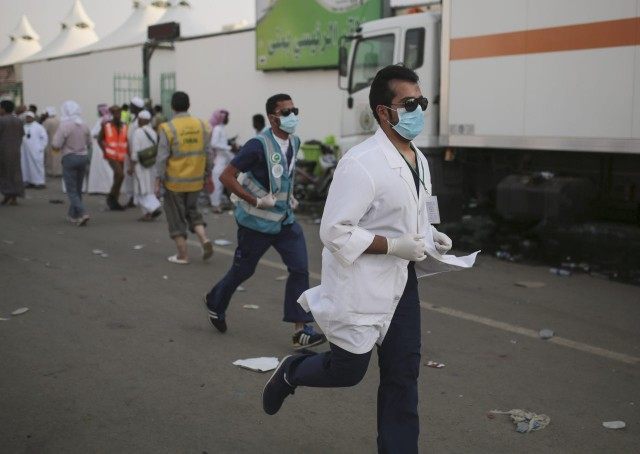World View: After Hajj Stampede Disaster, Muslims Debate the ‘Will of Allah’
- Death toll from Hajj stampede rises to 769, triggers fatalistic explanations
- Iran rejects Fatalism, blames Saudi officials for ‘crime’
- Muslims debate the role of the ‘Will of Allah’ in human life
- Theological contradictions in omnipotence and omniscience vs free will
Death toll from Hajj stampede rises to 769, triggers fatalistic explanations

View of the streets of Mina where the stampede occurred on Thursday (AP)
The Hajj is a pilgrimage to Mecca that every Muslim is required to make at least one in his lifetime. About two million Muslims from 180 countries around the world have arrived in Saudi Arabia in the past couple of weeks for their one in a lifetime Hajj pilgrimage.
On Thursday, hundreds of thousands of pilgrims were walking towards the site of one of the most important rituals, “stoning the devil,” which requires throwing seven stones at a pillar representing Satan in the city of Mina. However, when two massive crowds converged on the same narrow street, the people in front were forced to stop, while the ones hundreds of meters to the rear kept on walking. All of this took place under a burning hot sun, with a temperature of 46 degrees centigrade (= 114 degrees fahrenheit). The result was that hundreds of pilgrims suffocated or were trampled to death. One eyewitness said the majority of the dead people were elderly people who were walking with their children, who were not able to leave the children behind.
Initially, Saudi officials placed the blame on the pilgrims themselves for not following safety instructions, saying that many of the pilgrims, were “undisciplined and did not follow instructions.”
One Saudi official blamed “some pilgrims with African nationalities” for the incident, resulting in outrage in responses like, “Anti-black, anti-poor, xenophobic, totally outrageous yet predictable response from the Saudi Monarchy.”
Postings on many twitter accounts blamed the Saudis for poor administration in allowing the stampede to happen. Others blamed it simply on “human error,” and supported the Saudi officials by commending the quick work by first responders after the stampede.
The stampede incident comes just a few days after a massive construction crane collapsed into Mecca’s Grand Mosque, killing more than 100 people and leaving over 200 others wounded. ( “12-Sep-15 World View — Saudi Arabia’s Grand Mosque, site of huge construction accident, has links to 9/11″)
By Friday, Saudi officials were giving Fatalistic explanations. Sheikh Abdul Aziz al-Sheikh told Saudi officials:
You are not responsible for what happened. As for the things that humans cannot control, you are not blamed for them. Fate and destiny are inevitable.Arab News (Riyadh) and BBC and Reuters
Iran rejects Fatalism, blames Saudi officials for ‘crime’
Saudi Arabia’s enemy, Iran, is rejecting any claim that the stampede was the will of Allah, and is holding Saudi officials responsible.Iran’s president Hassan Rouhani gave a long-scheduled speech to the United Nations on Saturday, and used the speech to demand an international investigation into the cause of “this incident and similar incidents in this year’s Hajj rituals,” referring to the crane incident.
Iran’s Prosecutor General Ebrahim Raisi said:
We will urge international courts and circles to start the trial of the Saudis for their crimes against hajj pilgrims. This is not incompetence, it’s a crime.Of the almost 800 pilgrims killed in the stampede, at least 136 were from Iran, which was more than from any other country. Iran’s Foreign Ministry is protesting Saudi Arabia’s handling of the disaster, and said that Saudi Arabia has yet to issue visas for an Iranian delegation to visit the kingdom to oversee the treatment of injured Iranians and the repatriation of remains. Press TV (Tehran) and Hurriyet (Turkey) and Mashable
Muslims debate the role of the ‘Will of Allah’ in human life
Fatalism is relatively uncommon in the West. It is unusual for Westerners to blame even natural disasters on God’s will.In January 2010, evangelical Christian leader Pat Robinson was scorned when he said that the devastating Haiti earthquake occurred because Haiti had made “a pact with the devil” in defeating the French in 1804. He was similarly scorned linking Hurricane Katrina to abortion.
After the Lisbon earthquake of 1755, Voltaire wrote:
Would you say, seeing this heap of victims,However, Fatalism is expressed more commonly in the Muslim world, according to an analysis by Daniel Pipes, following the statements by Saudi officials to blame the stampede on Fate and Destiny.
That God is avenged, that their death is payment for their crimes?
What crimes, what bad things have been committed by these children,
Lying on the breasts of their mothers, flattened and bloody?
Lisbon is a city no longer. Did it have more vices
Than London, than Paris, given to doubtful delights?
Philosophical and theological dilemma goes like this: If humans have the ability to make decisions, this diminishes God’s universal powers. But if God makes all decisions, humans have no responsibility for their own deeds, negating such concepts as justice and punishment. For centuries, there have been two main Islamic schools of thought, one arguing for free will and one holding that God acts through man, and the individual has no say.
Pipes says that there are many fatalistic passages in the Koran, and gives some examples:
- Nor can a soul die except by God’s leave, the term being fixed as by writing.
- All people have a set term, and when the end of that term approaches, they can neither delay it by a single moment, nor can they speed it up.
- No misfortune can happen on earth or in your souls but is recorded in a book before We bring it into existence.
However, it is not all one-sided, even in Islam. Pipes also quotes a number of Koran passages that contradict the fatalistic outlook:
- God does not wrong people at all, but it is the people themselves who do wrong.
- God does not change the condition of a people until they change that which is in their souls.
Pipes also notes that neither activist Muslim crowds, such as those that overthrew governments in Iran and Egypt, nor jihadists use “Allah’s will” as an excuse to sit and do nothing.
However, what Pipes finally concludes is that Muslims are no more fatalistic than Christians, and that Muslim politicians use Fatalism as an excuse. Thus, when something goes wrong, they blame “the will of Allah” in the same way that President Obama might blame George Bush or the Republicans. But when something goes right, they take all the credit, just as any politician would. CNN (13-Jan-2010) and Middle East Forum
Theological contradictions in omnipotence and omniscience vs free will
In both Christian and Muslim theology, God/Allah is described as being omnipotent (able to do anything) and omniscient (knowing everything about the past, present and future).Granting such powers to God yields some important conundrums and contradictions. Can God make 1+1 equal 3? Mathematical logicians would say even God cannot create a mathematical contradiction. Can God create both an irresistible force and an immovable object — a theological question that was heavily debated a century ago?
The conundrums become much more personal when they involve a human being’s free will. In the Daniel Pipes essay referenced above, he quotes Bernard Lewis as follows:
In the great debate among medieval Muslim theologians on the question of predestination or free will, [chess and back-gammon] sometimes served as symbols and prototypes. Is life a game of chess, where the player has a choice at every move, where skill and foresight can bring him success? Or is it rather backgammon, where a modicum of skill may speed or delay the result, but where the final outcome is determined by the repeated throw of the dice?”In fact, the debate over omnipotence does not lead to a theological contraction over free will. One can say that God is omnipotent, but that he still allows individual humans free will, and only intervenes in human affairs at specific times for specified reasons.
But once you add omniscience to God’s capabilities, then you reach a genuine insoluble theological contradiction with free will. If God is omniscient, and in particular knows everything that is going to happen in the future, then there is no human free will, because it is impossible for any human to do anything different from what God knows is going to happen.
From the point of view of Computer Science and Mathematical Logic, we may not have free will anyway. After all, is our brain not just a collection of neurons and synapses just doing what they are programmed to do? One college professor that I had even took this concept a step farther, and suggested that each of our brains is nothing more than a Turing machine computer, and that God might even have inscribed each of our computer program codes in the bones of our heads and necks, just to be sure.







































No comments:
Post a Comment